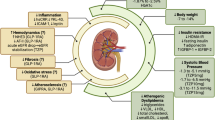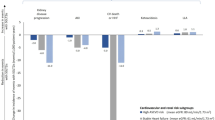Abstract
The onset of microalbuminuria (MA) heralds the onset of glomerulopathy in patients with glycogen storage disease (GSD) type I. Unlike tubulopathy, which responds to improved metabolic control, glomerulopathy in GSD I is considered refractory to medical intervention, and it is thought to inexorably progress to overt proteinuria and renal failure. Recent reports of reduced microalbuminuria following strict adherence to therapy counter this view. In contrast to type Ia, little is known regarding the prevalence of kidney disease in GSD Ib, 0, III, VI, and IX. Subjects were evaluated with 24-h urine collections between 2005 and 2014 as part of a longitudinal study of the natural history of GSD. ACE inhibitor therapy (AIT) was commenced after documentation of microalbuminuria. Elevated urine albumin excretion was detected in 23 of 195 GSD Ia patients (11.7%) and six of 45 GSD Ib (13.3%). The median age of onset of microalbuminuria in GSD Ia was 24 years (range 9–56); in GSD Ib it was 25 years (range 20–38). Of 14 with GSD Ia who complied with dietary and AIT during the study period, microalbuminuria decreased in 11, in whom metabolic control improved. All 135 patients with the ketotic forms of GSD (0, III, VI and IX) consistently had normal microalbumin excretion. Strict adherence to dietary therapy and maintenance of optimal metabolic control is necessary to halt the progression of GSD Ia glomerulopathy in patients treated with AIT. With optimal care, protein excretion can be reduced and even normalize.

Similar content being viewed by others
Abbreviations
- ACE:
-
Angiotensin converting enzyme
- AIT:
-
ACE inhibitor therapy
- GSD:
-
Glycogen storage disease
- MA:
-
Microalbuminuria
References
Beegle RD, Brown LM, Weinstein DA (2015) Regression of hepatocellular adenomas with strict dietary therapy in patients with glycogen storage disease type I. JIMD Rep 18:23–32
Burda P, Hochuli M (2015) Hepatic glycogen disorders: what have we learned in recent years? Curr Opin Clin Nutr Metab Care 18:415–421
Chen YT (1991) Type I glycogen storage disease: kidney involvement, pathogenesis and its treatment. Pediatr Nephrol 5:71–76
Chen YT, Van Hove JL (1995) Renal involvement in type I glycogen storage disease. Adv Nephrol Necker Hosp 24:357–365
Chen MA, Weinstein DA (2016) Glycogen storage diseases: diagnosis, treatment, and outcome. Transl Sci Rare Dis 1:45–72
Chen YT, Coleman R, Scheinman JI et al (1988) Renal disease in type I glycogen storage disease. N Engl J Med 318:7–11
Chen YT, Scheinman JI, Park HK et al (1990) Amelioration of proximal renal tubular dysfunction in type I glycogen storage disease. N Engl J Med 323:590–593
Derks TG, Smit GP (2015) Dietary management in glycogen storage disease type III: what is the evidence? J Inherit Metab Dis 38:545–550
Friedman AN (2004) High protein diets: potential effects on the kidney in renal health and disease. Am J Kidney Dis 44:950–962
Giatras I, Lau J, Levey AS (1997) Effect of angiotensin-converting enzyme inhibitors on the progression of nondiabetic renal disease: a meta-analysis of randomized trials. Angiotensin-converting-enzyme inhibition and progressive renal disease study group. Ann Intern Med 127:337–345
Kishnani PS, Austin SL, Arn P (2010) Glycogen storage disease type III diagnosis and management guidelines. Genet Med 12:446–463
Kishnani PS, Austin SL, Abdenur JE et al (2014) Diagnosis and management of glycogen storage disease type I: a practice guideline of the American College of Medical Genetics and Genomics. Genet Med. 16:e1
Ko GJ, Obi Y, Tortorici AR, Kalantar-Zadeh K (2017) Dietary protein intake and chronic kidney disease. Curr Opin Clin Nutr Metab Care. 20:77–85
Martens DHJ, Rake JP, Navis G et al (2009) Renal function in glycogen storage disease type I, natural course, and renopreservative effects of ACE inhibition. Clin J Am Soc Nephrol 4:1741–1746
Melis D, Parenti G, Gatti R et al (2005) Efficacy of ACE-inhibitor therapy on renal disease in glycogen storage disease type 1: a multicentre retrospective study. Clin Endocrinol 63:19–25
Melis D, Cozzolino M, Minopoli G et al (2015) Progression of renal damage in glycogen storage disease type I is associated to hyperlipidemia: a multicenter prospective Italian study. J Pediatr 166:1079–1082
Minarich LA, Kirpich A, Fiske LM et al (2012) Bone mineral density in glycogen storage disease type Ia and Ib. Genet Med. doi:10.1038/gim.2012.36
Neild GH, Thomson G, Nitsch D et al (2004) Renal outcome in adults with renal insufficiency and irregular asymmetric kidneys. BMC Nephrol 5:12
Rake JP, Visser G, Labrune P et al (2002) Glycogen storage disease type I: diagnosis, management, clinical course and outcome. Results of the European study on glycogen storage disease type I (ESGSD I). Eur J Pediatr 161:S20–S34
Reitsma-Bierens WC (1993) Renal complications in glycogen storage disease type I. Eur J Pediatr 152(Suppl):S60–S62
Remuzzi G, Benigni A, Remuzzi A (2006) Mechanisms of progression and regression of renal lesions of chronic nephropathies and diabetes. J Clin Invest 116:288–296
Ross K, Brown LM, Corrado MM et al (2016) Safety and efficacy of chronic extended release cornstarch therapy for glycogen storage disease type Ia. JIMD Rep. 26:85–90
Storch EA, Keeley M, Merlo LJ et al (2009) Psychosocial functioning in youth with Barth syndrome. Child Health Care 38:137–156
Taddeo D, Egedy M, Frappier JY (2008) Adherence to treatment in adolescents. Paediatr Child Health 13:19–24
Tsilianidis LA, Fiske LM, Siegel S et al (2013) Aggressive therapy improves cirrhosis in glycogen storage disease type IX. Mol Genet Metab 109:179–182
Van Schaftingen E, Gerin I (2002) The glucose-6-phosphate system. Biochem J 362:513–532
Wang DQ, Fiske LM, Carreras CT et al (2001) Natural history of hepatocellular adenoma formation in glycogen storage disease type I. J Pediatr 159:442–446
Weinstein DA, Wolfsdorf JI (2002) Effect of continuous glucose therapy with uncooked cornstarch on the long-term clinical course of type 1a glycogen storage disease. Eur J Pediatr 161:S35–S39
Weinstein DA, Somers MJ, Wolfsdorf JI (2001) Decreased urinary citrate excretion in type 1a glycogen storage disease. J Pediatr 138:378–382
Wolfsdorf JI, Laffel LM, Crigler JF Jr (1997) Metabolic control and renal dysfunction in type I glycogen storage disease. J Inherit Metab Dis 20:559–568
Yang HC, Fogo AB (2014) Mechanisms of disease reversal in FSGS. Adv Chronic Kidney Dis 21:442–447
Author information
Authors and Affiliations
Corresponding author
Ethics declarations
Conflict of interest
G. O. Okechuku, L. R. Shoemaker, M. Dambska, L. M. Brown, J. Mathew and D. A. Weinstein declare that they have no conflict of interest.
Funding
This research was made possible by philanthropic support provided by the Global Center for GSD and the following funds managed through the University of Florida Office of Development: Scott Miller GSD Program Fund, the GSD Dream Fund, and the Johnny Damon Fund. The work was also supported in part by the NIH/NCATS Clinical and Translational Science Award UL1 TR000064 granted to the University of Florida.
Ethical approval
These investigations were approved by the IRB at the University of Florida, and they were carried out in accordance with the Declaration of Helsinki.
Informed consent
Consent (and assent when appropriate) was obtained from all participants.
Additional information
Communicated by: Bridget Wilcken
Rights and permissions
About this article
Cite this article
Okechuku, G.O., Shoemaker, L.R., Dambska, M. et al. Tight metabolic control plus ACE inhibitor therapy improves GSD I nephropathy. J Inherit Metab Dis 40, 703–708 (2017). https://doi.org/10.1007/s10545-017-0054-2
Received:
Revised:
Accepted:
Published:
Issue Date:
DOI: https://doi.org/10.1007/s10545-017-0054-2




